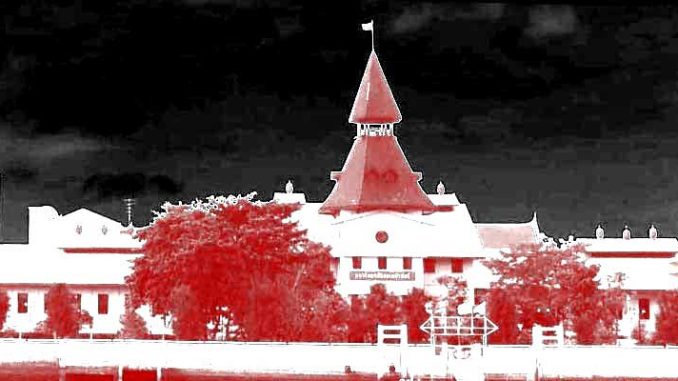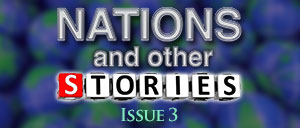
May this wrath
turn into strength
as mighty as a raging storm.
We shall rise up
and fight to the death
sacrificing our lives.
Millions upon millions of people
wrathfully and thunderously clamor,
the sky and oceans reverberating,
dictatorship trembling.
The Devil rules over this evil age,
selling out the nation, robbing the people,
collaborating with foreign invaders
to set up military bases all over the land.
They gag our mouths, shut our eyes and ears,
taking away our rights and freedom.
Guns in hands, together they occupy and plunder our land.
When the people peacefully protest,
they shun us and pretend not to understand.
Our words are spoken in vain
and met with only contempt.
Their mouthpiece slanders us,
distorts the news and makes wild allegations.
Their henchmen, armed to the teeth,
bludgeon and slaughter us.
Our friends were battered unconscious,
then hanged from a tree.
Their benumbed bodies were piled up,
drenched with gasoline and burned alive.
A carnival of carnivores,
with their bestiality let loose
to feed upon people’s flesh and blood,
devils in human disguise.
The land was soaked in blood,
fiery, bloody reddened everywhere.
And the ground was strewn
with the bodies of our fallen heroes.
Let us wipe away the blood and tears.
A costly lesson has just been learned,
for which we paid with our blood, tears and lives,
one we’ll never ever forget.
A peaceful, legal struggle could not but bring us futile deaths.
We can’t reason with brutes.
When they can kill people just like that,
it’s no use talking to them.
Let’s lay down our pens,
save our breath,
and retrain our hands
to take up guns instead.
An eye for an eye, a tooth for a tooth,
and a life for a life we’ll gladly exchange.
We’ll hold fast to the revolutionary line
till we exterminate all evils.
Let’s proclaim truth with bullets!
The people will support our fight.
With our great number, unity and determination,
the world will be turned upside down.
Our cherished people’s war
will surely triumph.
In the end, Thailand must belong to the Thais,
and all of us, free at last.
May the souls of our fallen heroes and friends
rest happy and assured
that the day of victory will soon come
and vengeance be visited upon the devils.
October 1976
What was so troubling about that massacre was not only the degree of violence used, but also the fact that a lot of ordinary Thai folks took part actively and bloodthirstily in lynching the students. Our fellow Thai countrymen must have really hated our guts to have killed us in that bestial manner.
That incident formed the background of the knowledge, method, and aspirations of the so-called “Octobrist” generation of Thai intellectuals and scholars, to which I belong. Hence the two basic facts about us are: the Thai (official) nation tried to kill us but we survived; and then we tried to make a revolution but it failed. In a way, our subsequent common intellectual trajectory has been a traumatic, persistent attempt, in our own separate ways, to find an appropriate and adequate intellectual answer and political response to those two problematics – why the Thai nation hated us so and why the revolution failed.
Given the collapse of the revolution in the early 1980s and with nothing better to do, scores of us went to the West for higher education, including me and a few ex-comrades who went to Cornell. Of course there we met Khroo Ben or Professor Benedict Anderson. It was Ben who started me thinking about the Nation as a cultural political project, a transitive reality, a state power-constituted construct that creates, delineates, and reproduces its own others. In the case of Thailand, the particular historical formation and configuration of the official national imagination has marked off as its prime ethno-ideological others the ethnic Chinese (derogatorily dubbed “Jek”) and the communists. The two happened largely to coincide in the early history of the communist movement in Thailand and, of course, I happened to be both a Jek and a communist – a doubly-othered of the Thai official nation.
It was also Ben who made me see for the first time my invisible “pigtail” and become aware of my Chinese ethnicity as a cultural political problem. Grasping Thainess and Chineseness as two sides of the same ethno-ideological coin, my academic-cum-cultural political ambition was to undermine the deadly cultural infrastructure of the Thai official nation which had made possible and justifiable such state terrorism against the people as the 6 October 1976 Massacre. A Thai nation that would be worth living in must be cultural-politically open to, as well as able to accommodate, the so-branded ethno-ideological un-Thais as rightful and equal members. The aim was to bequeath to future generations of Thais and un-Thais alike a land less murderous where they could live and argue with one another peacefully.
But how did one go about doing so academically? The provisional answer I improvised was to analytically and critically trace the genealogy (or the tradition of invention and reception) of a key signifier in modern Thai cultural politics, namely Thainess, all the while trying to destabilize, denaturalize or, if one prefers, deconstruct it in the most outrageously irreverent and iconoclastic, most sacrilegiously hilarious and profane manner possible, by making use of basic semiotic concepts and insights. With the sacred and deadly contents of Thainess emptied out and its lid thrown wide open, a semiotic space for contestation was thereby created in which alternative “un-Thai” meanings and referents could come freely into full play as “Thai,” including my favorite radical, popular candidates, in a dynamic and open-ended reimagination and reconstruction of a new Thai nation.
That’s how I have been trying to settle my account, intellectually, with the Thai/Chinese, or indigenous, or local, side of my cultural political formation. The other side is the single universalism of Western thought, which I dealt with through a retrospective engagement with my first political love, the one to which I lost my teenage ideological virginity, so to speak – Marxism-communism.
It began in the early 1990s during my doctoral dissertation research on the formation of modern Thai radical culture by post-war radical public intellectuals. Given my axiomatic belief as a good Maoist in the unproblematically universal character of Marxist-communist theoretical truth and concepts, I was surprised and amazed to find that these Thai discourse compradors, in their attempt to introduce Marxism-communism to the Thai public through the translation of key terms from Chinese and English into Thai – either inventing new Thai coinages or matching them with old Thai words – had actually transformed not only the outward appearance of these terms, their look and sound, but also their meanings and usages.
My two favorite examples are the various Thai translations of “bourgeoisie” and “proletariat,” two key Marxist-communist terms denoting the two main classes in a capitalist society. In the case of bourgeoisie, instead of following the rather neutral-sounding and low-key official Thai translation of kradumphi, an Indian-derived Thai word meaning “rich people,” the Thai communist intellectual Atsani Phonlajan (alias Naiphi) retranslated it as phaessaya, a Sanskrit-derived Thai word with the wonderful double meaning of “merchant class” and “prostitute or bitch.”
Proletariat, kammachip in Thai, went a different way. Initially, leftist intellectuals and students (many themselves low-ranking and low-paid government employees) fiercely, if confusedly, debated whether or not both Thai government employees and tricyclists (pedicab drivers) should be counted as members of the proletariat. Of course the proletariat was supposed to consist of property-less wage earners, and the former group, though middle-class by station, were indeed state-employed wage earners who didn’t own any means of production, while the latter, though dirt poor and toiling, nonetheless possessed as private property their own means of production – the battered tricycles.
Subsequently, kammachip came to mean something altogether different from “modern industrial workers” in actual political usage. The top ranks of the Communist Party of Thailand (1942 through the mid-1980s), purportedly the vanguard party of the Thai proletariat, held just a handful of Thai and Laotian industrial workers. Most were high school-educated, Sino-Thai, petty bourgeois, small and medium entrepreneurs, shopkeepers and their apprentices, along with a few university-educated intellectuals. It turned out that the Chinese apprenticeship ethics of self-discipline, diligence, endurance, self-abnegation, parsimony, and simple lifestyle were identified as universal “proletarian characteristics and virtues” and became the prescribed model and hallmark of CPT cadres and revolutionaries in the years of rural armed struggle.
My way of making sense of this process of transformation is to compare it with the start of a snooker game wherein a player hits a white ball against a triangular formation of other balls so that, upon impact, the balls scatter, going their own separate ways. It was as if, once imported (or smuggled) across linguistic boundaries, stripped of their original script and sound, made to incarnate Thai forms, thrown into a new semantic field, and shoved into various Thai verse genres, those poor alien Marxist words ran into a virtual mine-field of immensely complex rhyming, syllabic, accentual, rhythmic, and tonal rules and regulations that followed a totally disparate logic. Crashing into these cultural obstacles head-on, they disintegrated on impact into free-floating radical signifiers, multiple confusing signifieds, substituted referents, and incongruent practices, each going their own separate, mind-boggling way.
How did I come to terms with the phantasmagoria of single universalism? The Enlightenment belief in the universality of reason and transparency of the word-reality relationship has been proved overly optimistic by the actual cross-cultural, cross-language flows and motions of words and discourse. And yet this is no reason to give up the noble dream of universal reason. One need only understand that it is impossible to transplant intact a fixed signifier with definite signifieds, unchanging referents, and prescriptive practices from one culture and language into another because there are no such things in the first place. Having already disintegrated, any “universal” can come to other peoples only as a self-educating process in which they have to fight, experience, learn, improvise, invent, and reinvent that “universal” for themselves. Only through this actual, historical process can the free-floating signifier, the multiple signifieds, the substituted referents, and the mimic practices that together constitute any and every “universal” be reintegrated. Only in this way can their institutions be built and take root. A generous attempt in good faith to come up with a single definition of “universals” can never replace that process, for the only sustainable “universal” is the one that people learn to define and build for themselves, not the one decreed, then offered to or imposed on them by well-wishers.
So eventually we’ll end up with many different “universals.” Some may look like ours, others may not. Some we may envy, others we may disapprove of, so much so perhaps that we may not want even to call them “universal.” That’s fine, because our own universals (be they Buddhist, Islamic, Confucian, Asian, Thai, or Singaporean) are also far from perfection and contain many features which we hope to change and improve in years to come. That’s why the differences between our “universals” and others’ are no less important than our common ground. For differences invite us to compare, contrast, and learn from one another’s “universal” achievements and shortcomings. Let’s open up the vista of many “universals” and the opportunity for open-ended dialogue. In the process, we may change their definition of universals; they in turn may change ours. Thank God there’s no universal definition of universals. Let’s hope people can talk and argue about their universals in a sincere, free, and non-violent way.
Kasian Tejapira
Kasian Tejapira is assistant professor of political science at Thammasat University. This essay was adapted from his presentation at the Social Science Research Council Planning Workshop of the Field Research-Cum-Retooling Project for Junior Southeast Asian Researchers, held at the National University of Singapore, 30 November-1 December 2002.
Kyoto Review of Southeast Asia. Issue 3: Nations and Other Stories. March 2003

